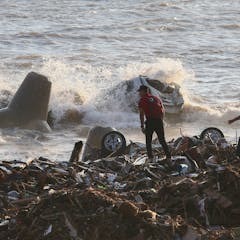
Articles on Carbon emissions
Displaying 1 - 20 of 491 articles

The Coalition’s pledge to build seven nuclear reactors poses serious questions about whether this nation can meet its international climate obligations.

Expanding the $22.7 billion Future Made in Australia program would enhance the country’s economic resilience and competitiveness.

Regulators, investors and climate advocates will be able to monitor what impact businesses are having on the environment under new accountability laws.

When it comes to storing carbon, alpine peatlands are powerhouses. But feral horse grazing and trampling tips the carbon balance in the other direction. We need to protect and restore our peatlands.

Business strategies to slash carbon emissions don’t just protect our environment but can help Australian companies attract global investment.

Organisms that produce synthetic fuel and suck carbon out of the air are just some of the possibilities of ‘engineering biology’ – if policymakers can shepherd the industry towards success.

For two years, Australia had a carbon price. Now we have a shadow price which won’t be paid by any emitter.

The sub-zero area of Antarctica has shrunk by over 100km since the 1950s.

Climate disclosure rules are meant to help investors understand their risks, but they come with costs for companies, as a finance scholar explains.

Underground thermal networks have the potential to revolutionize how Canadians heat their homes while helping to reduce carbon emissions.

To fight global warming we will soon have to try to remove carbon dioxide from the skies or find ways to reflect the Sun’s heat. Such radical paths must be examined, but risky experiments avoided.

The most comprehensive Australian carbon budget assessment completed to date shows the nation flip-flops from source to sink of carbon emissions, depending on the prevailing conditions.

Carbon pricing can be a powerful tool to combat climate change and reduce emissions, but it needs to be accompanied by improved regulations, clean technology subsidies and financing mechanisms.

As Climate Change and Energy Minister Chris Bowen lands in Dubai for COP28, Australia has announced an extra A$150 in climate finance with a focus on the Pacific region.

How many years you reuse a fake holiday tree matters. So does what happens to a live tree when you’ve packed up the ornaments.

Record emissions are fast shrinking the remaining amount of carbon dioxide we can emit if we are to limit global warming. At current rates, we’ll use up the budget for a 1.5°C outcome in seven years.

We can’t prevent continued global warming without reaching net zero carbon dioxide emissions. New climate simulations show what might happen when we get there.

Australia’s latest climate change statement shows we have little hope of reaching net zero emissions by 2050. There’s good news on the 2030 target, but then what?

Electric arc furnaces can use up to 100% scrap steel as its raw material, resulting in a significant reduction in emissions.

Africans need to re-envision what climate resilient development means within unique African city contexts.
